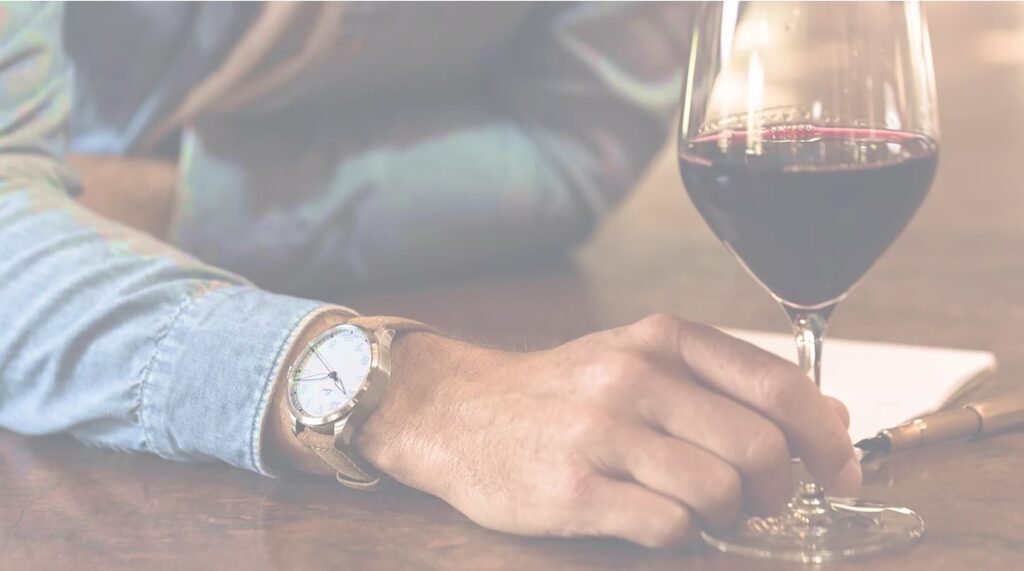When we think about the great wines of the world, we humanise the bottles: how will they age? How will they withstand the all-important passage of time? Like many passion assets, fine wine can be enjoyed at face value, but in this rapidly changing world, collectors often look beyond their own gratification for a more meaningful “raison d’être”: the preservation of nature, culture, and craft into the future. A watchmaker described this better than we ever could;
“You never really own a Patek Philippe. You simply look after it for the next generation”.
Value in Watches & Wine
We often consider parallels between wine and other collectibles, and the world of watches seems the closest comparable universe. Having recently teamed up with Phillips Watches to discuss the value of both, we share below an extract from a conversation between Phillips’ watch expert, Alex Ghotbi, and 1275’s founder & CEO, Denis Houlès.
Q: What is it that draws people in to collecting wines and watches today?
![]() The long (12,000-year) history of wine, and the progress in winemaking that has been made in recent years fascinates people. Wine is a commodity and a consumer product, but it has also become a luxury (and an asset class). It’s a luxury that expresses nature, stories of men and women behind the bottles, and that can be shared between friends and family. Wine also has a variety of styles, and a transformational quality that means you never stop learning or exploring.
The long (12,000-year) history of wine, and the progress in winemaking that has been made in recent years fascinates people. Wine is a commodity and a consumer product, but it has also become a luxury (and an asset class). It’s a luxury that expresses nature, stories of men and women behind the bottles, and that can be shared between friends and family. Wine also has a variety of styles, and a transformational quality that means you never stop learning or exploring.
![]() Watches certainly have the same appeal for anyone who appreciates craftsmanship, and the variety we find between watchmakers. No one “needs” an analogue watch – we all have iPhones to tell us the time – but the intricate engineering and the expertise of the men and women who create time pieces is something precious, that people want to preserve. The technical ability combined with the aesthetic of something so beautiful that you can “consume” by wearing it on your wrist is enticing.
Watches certainly have the same appeal for anyone who appreciates craftsmanship, and the variety we find between watchmakers. No one “needs” an analogue watch – we all have iPhones to tell us the time – but the intricate engineering and the expertise of the men and women who create time pieces is something precious, that people want to preserve. The technical ability combined with the aesthetic of something so beautiful that you can “consume” by wearing it on your wrist is enticing.
Q: How would I go about starting a wine or a watch collection today?
![]() For wine it depends on the objective. For drinking, follow your nose – try different wines, figure out what you like, and then learn more about the people behind the bottles by going to tastings or travelling to wine regions. For investing and building a legacy collection you need to have more discipline, and a better understanding of the fine wine investment market. Wine is deeply personal, but successful transmission of a collection should allow for optionality – this means collecting wines that will provide value over time, and also have a deep enough resale market.
For wine it depends on the objective. For drinking, follow your nose – try different wines, figure out what you like, and then learn more about the people behind the bottles by going to tastings or travelling to wine regions. For investing and building a legacy collection you need to have more discipline, and a better understanding of the fine wine investment market. Wine is deeply personal, but successful transmission of a collection should allow for optionality – this means collecting wines that will provide value over time, and also have a deep enough resale market.
![]() For watches, I would take quite a different approach, and advise you to always buy what you like. If you don’t know what you like yet, there is information everywhere today, online, in speciality magazines, through existing watch collectors to help you learn and explore the different styles and brands. Watches are made to be worn and seen, so I would encourage you to purchase something you will want to use, rather than something to keep locked away in its box (but do keep the original box!).
For watches, I would take quite a different approach, and advise you to always buy what you like. If you don’t know what you like yet, there is information everywhere today, online, in speciality magazines, through existing watch collectors to help you learn and explore the different styles and brands. Watches are made to be worn and seen, so I would encourage you to purchase something you will want to use, rather than something to keep locked away in its box (but do keep the original box!).
Q: Is there anything collectors should avoid doing?
![]() They say when you buy a property you should think location, location, location – for watches it’s “condition, condition, condition”. If you’re looking to buy vintage, then avoid purchasing anything that you can’t inspect, that isn’t in good condition, or that doesn’t come with guarantee and/or paperwork of its ownership history.
They say when you buy a property you should think location, location, location – for watches it’s “condition, condition, condition”. If you’re looking to buy vintage, then avoid purchasing anything that you can’t inspect, that isn’t in good condition, or that doesn’t come with guarantee and/or paperwork of its ownership history.
![]() I would say something similar for wines, but our word is “provenance, provenance, provenance”. There are plenty of fake wines in the secondary market (watch Sour Grapes to learn more about this), but there are also many wines with an invisible problem – damage to the liquid inside the bottle through bad transport or storage conditions. The only way to avoid this is buying through reputable outfits as soon as a wine is released, or through somewhere that can provide full and transparent guarantee of ex-domain quality.
I would say something similar for wines, but our word is “provenance, provenance, provenance”. There are plenty of fake wines in the secondary market (watch Sour Grapes to learn more about this), but there are also many wines with an invisible problem – damage to the liquid inside the bottle through bad transport or storage conditions. The only way to avoid this is buying through reputable outfits as soon as a wine is released, or through somewhere that can provide full and transparent guarantee of ex-domain quality.
Overall we’d say the main similarities between both collectibles are their emotional and intellectual value through the craftsmanship of making a wine or a watch, and the ability to transport both through time, whether that’s to enjoy for oneself, or to pass down to the next generation.

